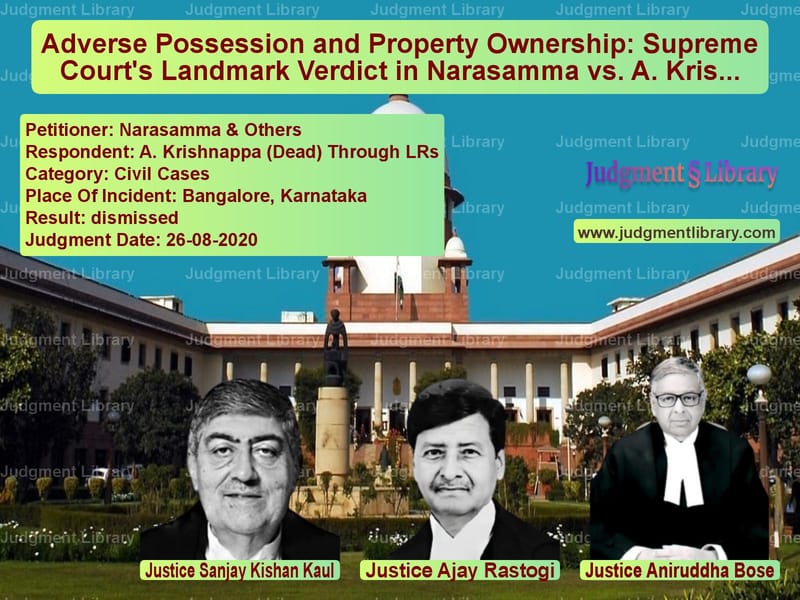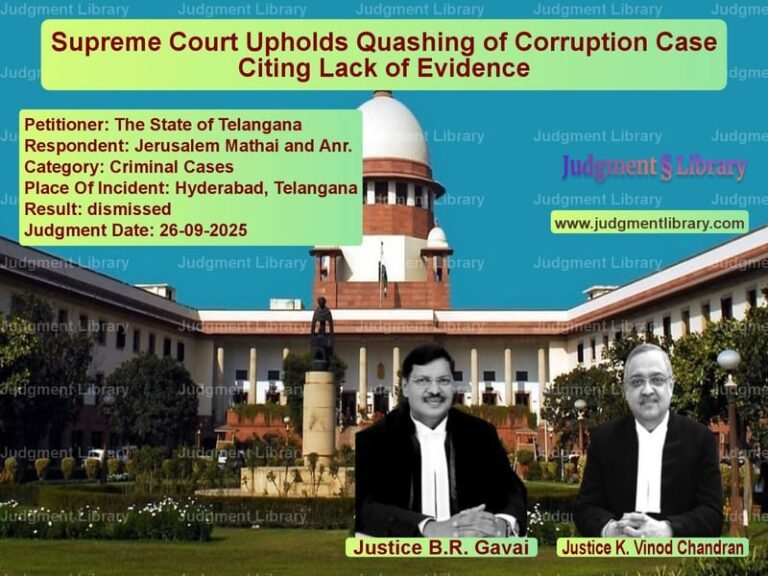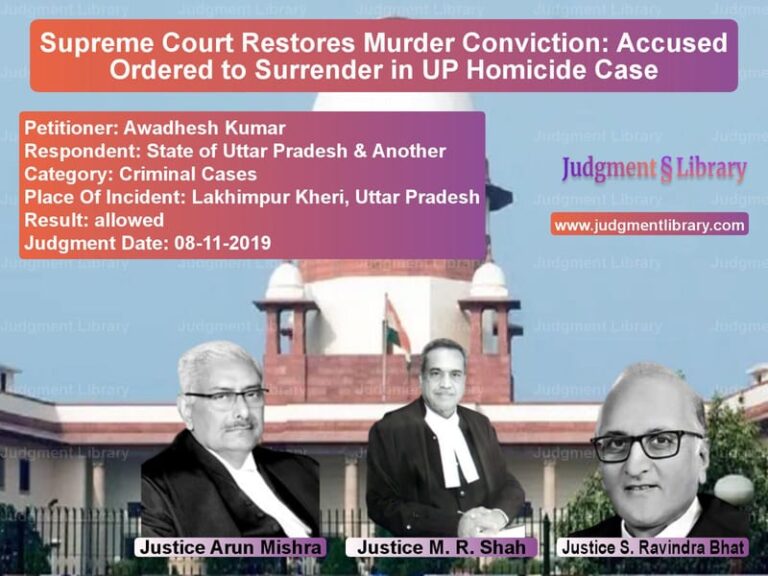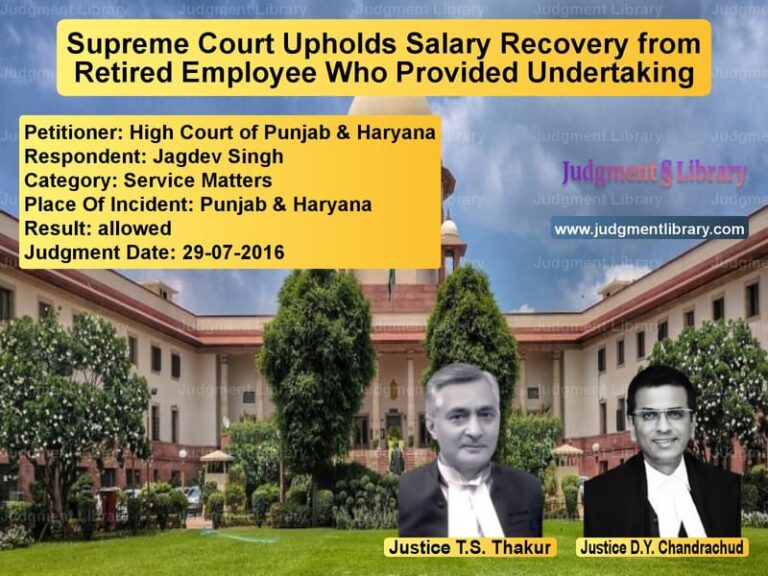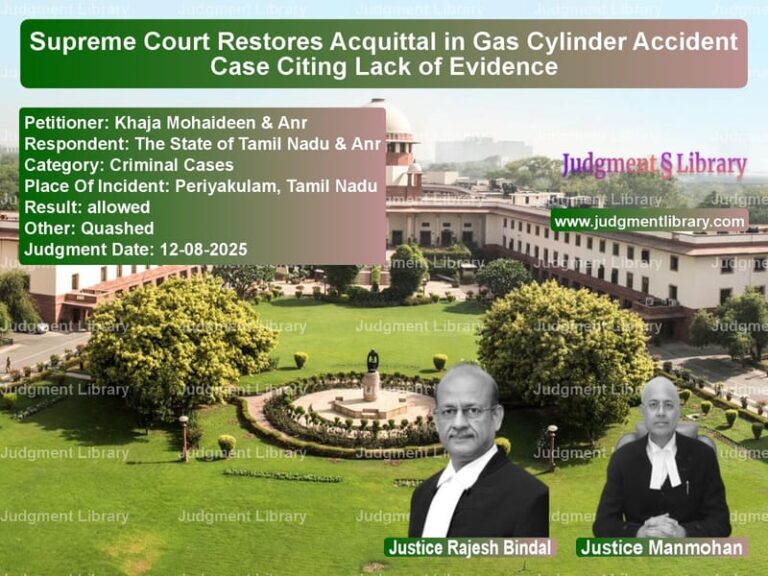Adverse Possession and Property Ownership: Supreme Court’s Landmark Verdict in Narasamma vs. A. Krishnappa
The Supreme Court of India, in its judgment dated August 26, 2020, delivered a crucial ruling in a long-standing property dispute between Narasamma & Others and A. Krishnappa. The case revolved around ownership claims over a property in Bangalore, Karnataka, and whether the appellants had perfected their title through adverse possession.
The core legal issue in the case was whether Narasamma, the wife of the original defendant, had legally acquired ownership of the disputed property or had gained possession through adverse possession. The case saw multiple rulings from the trial court, the Karnataka High Court, and ultimately the Supreme Court.
Background of the Case
The property in question was part of a larger ancestral land owned by A. Krishnappa and his late brother, A. Muniswamappa. The two brothers divided the land and sold some plots while retaining others. After the death of Muniswamappa in 1988, the plaintiff, Krishnappa, claimed full ownership over the disputed land.
According to Krishnappa, the original defendant, Sri Jayaram, was allowed to use the land rent-free to run a fuel depot as a temporary arrangement. However, when the plaintiff asked for the land back, the defendant refused to vacate, claiming ownership.
The defendant’s claim was based on a 1976 agreement of sale, in which Muniswamappa allegedly sold the land to his wife, Narasamma. However, this agreement was never registered, leading to doubts over its validity.
Petitioners’ Arguments (Narasamma & Others)
The appellants contended that:
- They had purchased the property from Muniswamappa in 1976 through a valid sale agreement.
- They had been in continuous possession of the land for more than 12 years, thereby acquiring ownership through adverse possession.
- Even if the sale agreement was deemed invalid, their possession had become adverse to the plaintiff’s ownership claim.
- The suit for possession was barred by limitation as it was filed in 1989, more than 12 years after they took possession.
- The plaintiff had taken no action for several decades, indicating their lack of interest in reclaiming the land.
Respondents’ Arguments (A. Krishnappa & Others)
The respondents countered that:
- The sale agreement was never legally executed and lacked proper registration.
- The defendants were allowed to stay on the land on a temporary, rent-free basis, which did not amount to ownership.
- Their possession was permissive, not adverse, as they had been given access to the land by the original owner.
- The suit for possession was filed within the legal timeframe once the defendants refused to vacate.
- Permissive possession cannot automatically convert into adverse possession unless a clear and hostile claim is made against the true owner.
Supreme Court’s Observations
The Supreme Court meticulously examined the case and made key observations:
- The sale agreement was never registered, and its authenticity was doubtful.
- The defendant’s possession was originally permissive, meaning they were allowed to use the land temporarily by the original owner.
- For a claim of adverse possession to succeed, the occupier must show that they held the land openly, continuously, and in hostility to the true owner.
- The defendants failed to prove when their possession became adverse.
- The plaintiff had consistently claimed ownership, which nullified the defendants’ argument of uninterrupted adverse possession.
Important Verbatim Observations by the Supreme Court
“The possession has to be in public and to the knowledge of the true owner as adverse, and this is necessary as a plea of adverse possession seeks to defeat the rights of the true owner.”
“The law would not be readily accepting of such a case unless a clear and cogent basis has been made out.”
“Permissive possession cannot be converted into adverse possession unless there is open assertion of ownership, which is contrary to the rights of the true owner.”
Legal Principles Established by the Judgment
This ruling reinforces several legal principles regarding adverse possession:
- Adverse possession must be continuous, open, and hostile to the real owner’s interests.
- A mere claim of possession for 12 years is insufficient; there must be evidence of hostility and denial of the real owner’s rights.
- Unregistered sale agreements do not confer ownership rights under Indian property law.
- Permissive possession remains valid only as long as the original owner allows it, and it cannot become adverse without a clear act of hostility.
- Litigation over land disputes must adhere to the limitation period, but mere inaction by an owner does not imply abandonment of ownership rights.
Final Verdict
The Supreme Court ruled that:
- The appellants had failed to establish ownership through sale or adverse possession.
- The respondents’ ownership rights were upheld, and they were entitled to reclaim possession.
- The appellants must vacate the land by December 31, 2020, failing which legal action could be taken against them.
- The appeal was dismissed with costs imposed on the appellants.
Impact of the Judgment
This ruling has significant implications for property law in India:
- It reaffirms that unregistered sale agreements do not confer ownership rights.
- It clarifies that permissive possession does not automatically become adverse possession.
- It ensures that rightful owners can reclaim their land if possession was initially granted under a license or temporary arrangement.
- It sets a strong legal precedent for future property disputes involving adverse possession claims.
- It reinforces that courts will scrutinize claims of adverse possession strictly and will not allow misuse of the principle to usurp land unlawfully.
The Supreme Court’s ruling provides clarity on property rights and prevents misuse of adverse possession claims to encroach on legally owned land. It ensures that landowners can exercise their rights and that legal procedures must be followed in property transactions.
Petitioner Name: Narasamma & Others.Respondent Name: A. Krishnappa (Dead) Through LRs.Judgment By: Justice Sanjay Kishan Kaul, Justice Ajay Rastogi, Justice Aniruddha Bose.Place Of Incident: Bangalore, Karnataka.Judgment Date: 26-08-2020.
Don’t miss out on the full details! Download the complete judgment in PDF format below and gain valuable insights instantly!
Download Judgment: Narasamma & Others vs A. Krishnappa (Dead) Supreme Court of India Judgment Dated 26-08-2020.pdf
Direct Downlaod Judgment: Direct downlaod this Judgment
See all petitions in Property Disputes
See all petitions in Landlord-Tenant Disputes
See all petitions in Specific Performance
See all petitions in Judgment by Sanjay Kishan Kaul
See all petitions in Judgment by Ajay Rastogi
See all petitions in Judgment by Aniruddha Bose
See all petitions in dismissed
See all petitions in supreme court of India judgments August 2020
See all petitions in 2020 judgments
See all posts in Civil Cases Category
See all allowed petitions in Civil Cases Category
See all Dismissed petitions in Civil Cases Category
See all partially allowed petitions in Civil Cases Category

